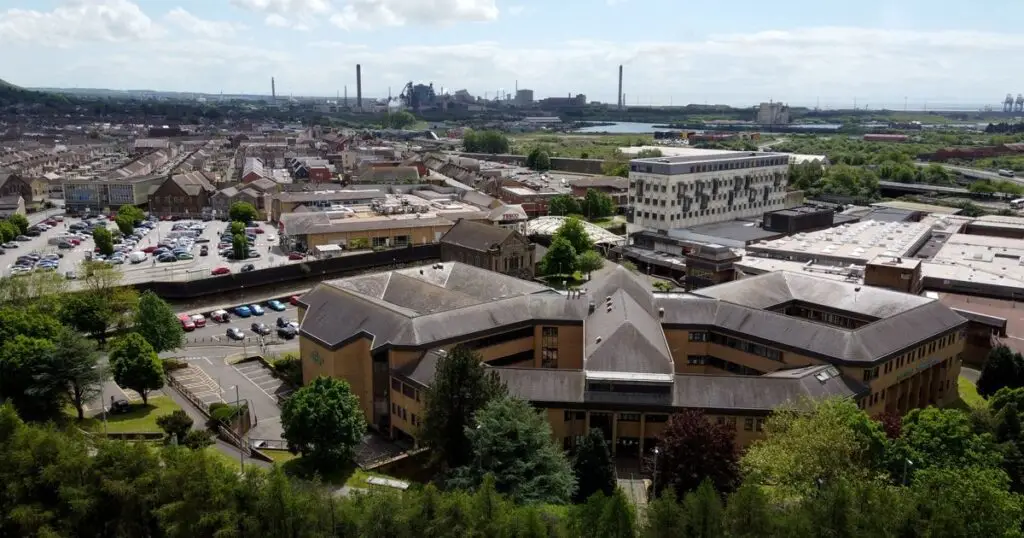The Government has announced a “new and improved” deal to support the transition towards greener steel production at Tata Steel’s major facility in Port Talbot, South Wales.
Officials have stated that workers at the site will benefit from enhanced redundancy terms and access to a skills package. Despite the positive steps, approximately 2,800 jobs are anticipated to be lost due to the closure of blast furnaces and the shift to electric arc production methods. The government has pledged £500 million to aid the transition, with provisions to reclaim the investment if Tata Steel fails to maintain 5,000 jobs within its UK operations post-transition.
Wednesday’s announcement of the “new and improved deal” is said to surpass previous agreements, offering full-time employees a minimum voluntary redundancy payment of £15,000, along with a £5,000 ‘retention’ bonus and funded training opportunities. Business and Trade Secretary Jonathan Reynolds commented: “Port Talbot has always been and will always be a steelmaking town. This deal does what previous deals failed to do give hope for the future of steelmaking in South Wales.”
He further criticised past government negligence, stating: “Steel is fundamental to the UK’s economy, sovereignty and communities, but previous government inaction has blighted the steelmaking industry.” Reynolds concluded by emphasising the current administration’s commitment: “That’s why this Government is taking strong action through a new deal and strategy which will reverse the industry’s stagnation and set out a long-term vision for a bright and sustainable future.”
“We know that a cleaner, greener future for UK steelmaking is vital to the industry’s long-term economic stability.” “The road ahead is not without its challenges but our steel strategy will set forth a positive vision for the future of the industry, backed by our manifesto commitment to £3 billion of government investment.”
Tata has announced plans to shut down the remaining blast furnace at Port Talbot by the end of the month to pave the way for the transition to a new electric arc furnace, which will require fewer workers. The company is offering what it describes as its most generous voluntary redundancy package for a restructure of this magnitude. Under the terms of the package, employees who opt for redundancy will receive 2.8 weeks’ pay for each year of service, with the cap placed at 25 years.
An agreement with Tata was reached on Tuesday during discussions involving the Prime Minister, Business and Trade Secretary, Chancellor Rachel Reeves, and Tata’s chairman Natarajan Chandrasekaran. Government ministers have hailed this as the first step in realising the government’s ambitions for the steel sector, signifying a “bright future” that capitalises on industrialisation and decarbonisation efforts.
The Welsh Secretary, Jo Stevens, said: “This improved deal secures the immediate future of Port Talbot steelworks, lays the foundations for future investment and enhances protections for the workforce across South Wales, all without further cost to the taxpayer.”
The government has emphasised its proactive response and the distribution of funding to assist businesses and workers in Port Talbot and across South Wales, amidst difficult times for Tata employees and local communities. Furthermore, there is a resolute commitment from the government to support the Welsh steel industry, whatever the outcome.
Charlotte Brumpton-Childs, GMB National Officer, acknowledged: “Since the election the Government has had extensive discussions with Tata and has strengthened investment assurances.” She added: “Tata has now given binding commitments to work quickly to invest and unlock further investments.”
A joint statement from the Community union and the GMB reflected a measured stance, commenting: “This deal is not something to celebrate, but with the improvements the unions and the Government have negotiated it is better than the devastating plan announced by Tata and the Tories back in September 2023.” Unite General Secretary Sharon Graham recognised the importance of government intervention, stating: “The two-stage government commitment to provide serious funding for steel in South Wales is vital for local communities and the long-term future of the steel industry.” Graham also criticised the previous administration by saying: “The last government was quite frankly asleep at the wheel.” “The present crisis is a direct result of it failing to invest in the UK steel industry and allowing the companies involved to rundown their operations and let them fall into disrepair. Conservative inaction and disdain have resulted in wholly avoidable job losses.”
The transition to a greener steel production method at Port Talbot signifies a significant investment in both the industry’s future and the community’s welfare, despite the anticipated challenges and job losses.


